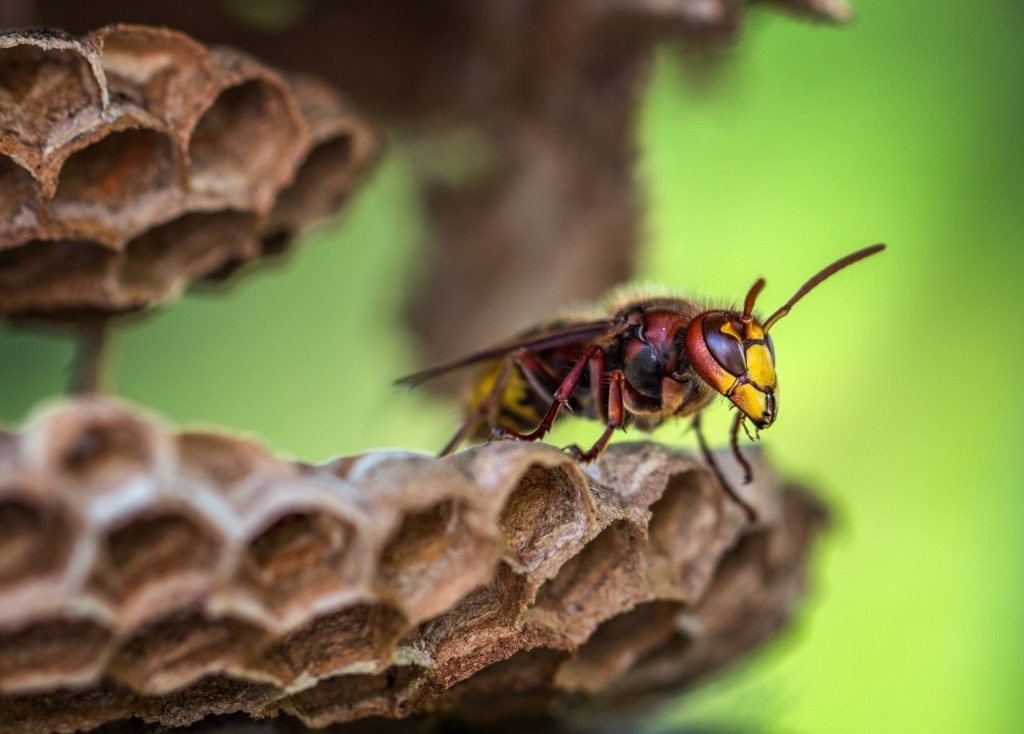Staying outdoors is a great way of appreciating nature in all its glory. But nature has a dark side in the form of wasp bites. Wasp stings are not just annoying but also painful.
A simple solution is using chemical insecticide products but a better one is to use natural repellants.
However, there is a choice of a number of homemade natural wasp repellents is available depending on their preference and effectiveness.
Wasps are known for their painful stings. An average adult can tolerate more than 1000 stings and still survive. But for a person allergic to wasp stings, even one of them can prove fatal. Even a single sting can cause anaphylactic shock in a normal healthy person with a wasp allergy.
Anaphylactic shock is an allergic reaction in which the blood pressure of a person falls severely and their airway closes at the same time. Every year more than 220,000 people have to visit the emergency room after being stung by wasps, hornets or bees. Out of which 60 lose their battle with life as a result of an anaphylaxis reaction.
It is almost impossible to know whether or not a person is allergic to a wasp. A majority of people who die due to wasp stings are unaware of their susceptibility. Therefore the best possible action is to avoid their stings at all cost. Wasps not only sting they even damage property by making tunnels in any wooden structure outside a house.
Note: Natural repellents can only be used if you have small infestation. For large infestation that is beyond your control, you have to either use pesticides or contact pest control professional to control wasp effectively.
Table of Contents
Types of Wasp Repellents
There are many natural ways of avoiding and even getting rid of wasps without having to spray toxic chemicals. These natural cost-effective fixes not only repel wasps away from people but also stop their invasion from the inside and outside of their homes.
1. Essential Oil Mix:
A number of natural essential oils can be used to repel wasps. Some of the most effective essential oils which act as wasp repellent are citrus, eucalyptus, lavender, lemongrass, geranium, clove and peppermint.
All you need is water and a few drops of essential oil.
After adding essential oil of your choice in a spraying water bottle in 1:5 proportions mix it well.
The essential oils can all be mixed together or even a single type of essential oil can do the job.
The mixture can be rubbed on hands, wrists and even hair to keep the wasps away.
Take care not to use any of the essential oil directly on the skin to avoid any adverse allergic reaction. Doing a little skin test before using the mixture freely is recommended.
The essential oil blend can also be used as a natural insecticide around the house to repel wasps. Just spray the solution over windows and door frames which will avoid the risk of wasps entering the house through them.
2. Baby Powder:
Baby powder is one of the easiest ways of preventing a wasp sting while outside.
Simply rubbing baby powder on oneself is enough to repel any wasps in the vicinity from a person.
The cost-efficient technique is best suited for people who love to stay outside or are habitual gardeners
The talc in baby powder repels wasps and can be sprinkled on the person or even in the vicinity to prevent a wasp sting. You can repel wasp for 2-3 hours using baby powder. So if you are in your garden or somewhere for a short period of time, this is best choice to protect yourself.
3. Sugar and Water Trap:
This article is based on repelents but who cares ? You want to control wasp, no matter what.
Let me tell you another popular technique to trap wasp and get rid of them permanently.
A sugar and water trap is not a repellent but more so a simple homemade technique of getting rid of wasps in and around the house.
The trap gets rid of wasps by attracting them towards a container and then capturing them inside it. Wasps love sugar and if a mixture is lying around your house they will immediately be drawn to it and go straight for it.
All you need is to mix sugar in warm water until it dissolves.
Pour the mixture in an empty soda bottle or any container with a small opening.
Wasps can fly into these bottles but figuring their way out can be a problem for them.
The sticky sugar solution also acts as a trap for the wasps against the container. This simple yet effective trap can be set up anywhere around or outside the house.
If you are not DOI person, you can use traps available in the market. I wrote a detailed article on best wasp trap, please read it to learn more about different types of traps and how to use them.
4. Soap Water:
Simple soap is good enough to ward away wasps. Just make soap and water solution.
The best option is to mix liquid soap with water and add it into a spraying bottle to be used as a repellent. You can spray any wasp nests around your property with the solution.
According to a study carried out by researchers at the University of Graz, Austria, soap negatively affects the breathing of wasps. A soap solution can stop breathing in wasps leading to their death in an environmentally friendly way.
Keep mixed liquid soap near wasp nest can give you very quick know down.
This method is very cost effective. It would cost you only $3-4
5. Vinegar Water:
Vinegar is another natural solution which can be fatal for wasps.
Vinegar water has the ability to repel wasps as they can smell it from far away. Spraying vinegar water outside of your home can prevent their nesting as they would avoid the areas where it has been sprinkled.
6. Spicy Water:
Water mixed with chilli peppers is another simple yet effective way of repelling wasps.
Just take two chilli peppers from your kitchen, chop them up and add to a pot with about three cups of water.
Boil the mixture for a few minutes and then allow it to cool down.
Fill up a spray bottle with the solution and spray it on wasp nest outside your house.
Be careful to use this spicy water recipe for only outdoors and keep away from any children.
The spiciness of peppers can react with wasps making them flee.
7. Scattering:
Natural ingredients such as cucumber pieces, bay leaves and cinnamon powder can also be scattered around wasp nests to repel them.
Simply cutting pieces of cucumber which are acidic to wasps can make them flee.
Similarly the smell of bay leaves and cinnamon can repel wasps when scattered around their nests. Although one has to scatter these ingredients for at least two weeks near the nest for the wasps to scatter.
8. Planting Wasp Repellent:
You can avoid the invasion of wasp nests from your garden or home by planting herbs which naturally repel them. Some of the best plants for wasp repelling are:
- Peppermint
- WormWood
- Lemongrass
- Lavender
Even dried cuttings of these plants lying around the house can keep the wasps away.
Natural Repellents vs Synthetic Pesticides
The purpose of a pesticide is to kill pest which poses a danger to a person’s life and property. However, the toxic nature of chemical pesticides is making a majority of people wary of them.
Chemical toxicity poses a threat to not just the user’s health but also to their pets and plants around or outside the house.
As a result of this dilemma, natural repellents have gained more popularity as a safe and harmless alternative to pesticides. Natural repellents do not pose any health threats while being safe to handle and eco-friendly than their chemical derivatives.
However, unlike chemical pesticides, their natural counterparts do not have long residual activity time. The natural versions are not as heavy and effective for longer periods of time.
As i stated above, natural repellents can only be used in your home and relatively for small infestation. In commercial areas/garden and anywhere you found wasp on large scale, you should either use pesticides or contact pest control technicians.
Because you won’t be able to control large infestation with just repellents.
Natural repellents are also less specific in their mode of action than synthetic pesticides.
Any doubts? Drop a comment below.

